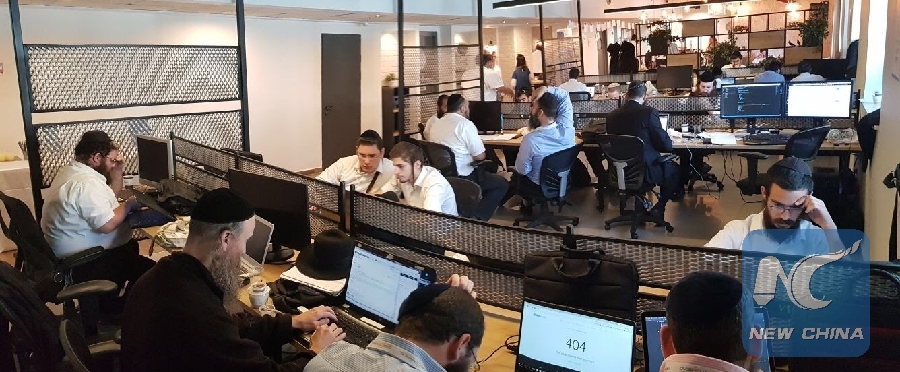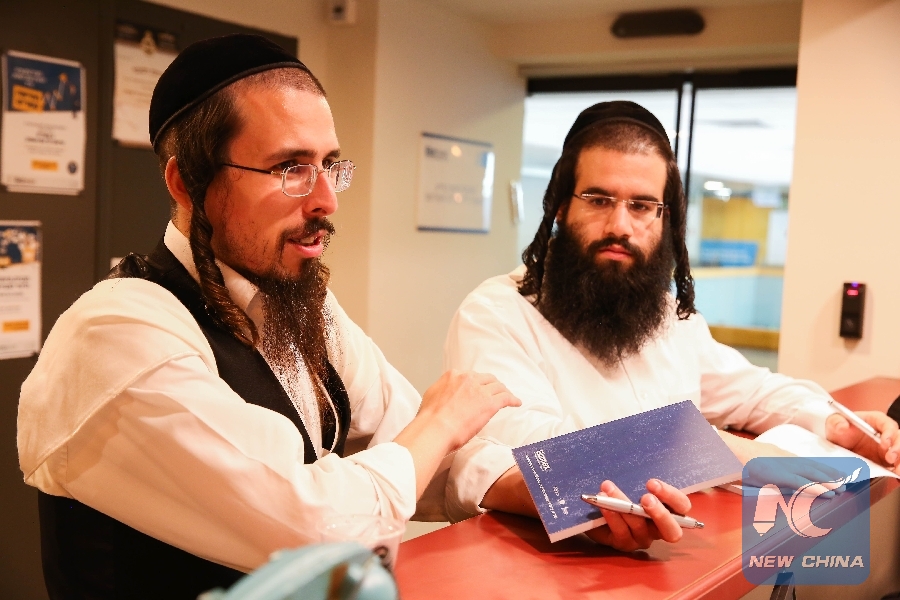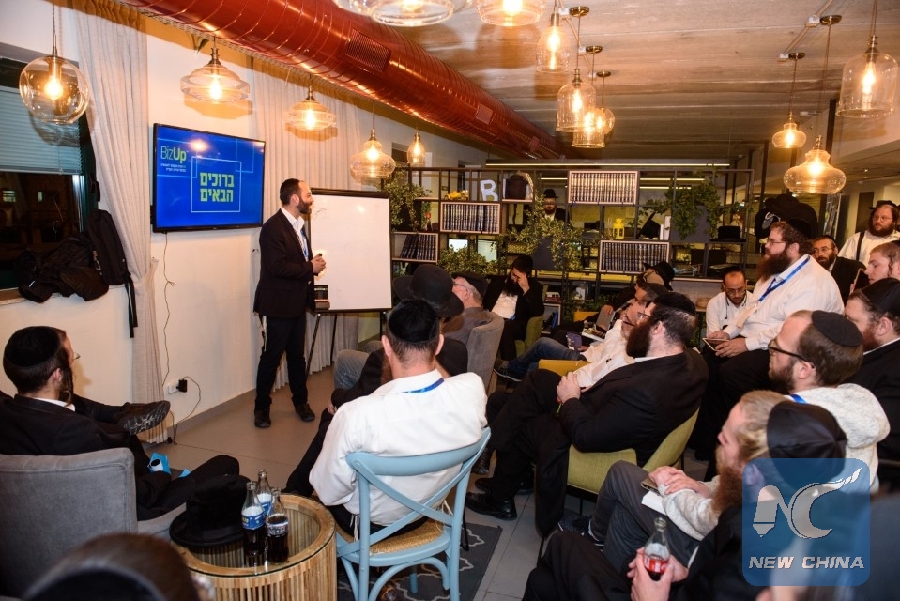
Ultra-Orthodox Jews work at Bizmax in central Jerusalem. (Provided by Bizmax)
by Keren Setton
JERUSALEM, Nov. 16 (Xinhua) -- For the male ultra-Orthodox receptionist to hi-tech incubator Bizmax in central Jerusalem, he has seen more and more ultra-Orthodox Jews coming to ask him about starting a hi-tech business.
In the divided city, approximately 45 percent of the population are religious Jews who practice a stringent way of life that makes their incorporation into the modern world challenging.
In recent years, a change is happening and more and more religious Jews are finding themselves part of the budding Jerusalem hi-tech ecosystem.

Two ultra-Orthodox Jews are shown in the picture. (Provided by Bizmax)
Ultra-Orthodox Jews are often referred to as Haredi Jews, from the Hebrew word "fear."
"The fear is for a change, which is more than a business change or speaking English or not speaking English," said Motti Eichler, chairman and co-founder of Achim Global, a non-profit organization aimed at helping incorporating ultra-Orthodox Jews into the business world.
"The fear is that it will be a change of life, a change of believing to keep the religious rules which has been keeping us for thousands of years," Eichler told Xinhua, adding that "in the mindset of the Haredi community, everything new is something should be afraid of."
After years of secluding themselves, also in education, gaps have widened and made it increasingly difficult for Haredi Jews to integrate into the workforce.
In the Orthodox schools, math, sciences and English are often sidelined for more hours dedicated to religious studies.
Yitzik Crombie, an ultra-Orthodox entrepreneur and founder and CEO of Bizmax, says the gap is a result of decades of isolation that needs to be fixed.
"We are fixing the situation. You can join the workforce and still keep your way of life," Crombie told Xinhua.
Bizmax is open only to ultra-Orthodox males. There are shelves at Bizmax packed with not only religious books, but also business books. Religion is up front, but the business side is not neglected.
"We do it evolutionary, not revolutionary," Eichler explained, adding that "our goal is not to change them but to help them."
Prayers are held several times a day with small groups sitting and working out a religious conundrum during the working hours.
The kitchen is kosher, adhering to strict Jewish dietary law. But the smell of freshly brewed coffee fills the halls - coffee is the universal drink of any workspace apparently.
"You want to be in an environment comfortable and you are productive at work," said Josh Filer, a 36-year-old Haredi Jerusalemite who rents office space at Bizmax for his online gift supplying business.

Ultra-Orthodox Jews are in a lecture at Bizmax in central Jerusalem. (Provided by Bizmax)
Bizmax has provided a home for around 100 companies, the majority is in hi-tech but not all. Aside from supplying office space and basic needs of budding business, it also offers mentoring, conferences and workshops for newbies.
A business English course is a popular selection amongst newcomers who are not taught the language at school like secular Israelis are.
Lectures on how to be a freelancer or how to increase social media presence are also given.
Recently, Bizmax announced that a start-up received mentoring and guidance from them managed to raise over half a million U.S. dollars from Israeli Innovation Authority to further develop their idea.
Poverty in the ultra-Orthodox community is much more prevalent than amongst the non-Orthodox population. According to a report by Israel Democracy Institute (IDI), over 50 percent of the Haredi population lived below the poverty line in 2017.
For Eichler, it is part of his goal to help his community become less dependent on welfare and other subsidies.
Israel has a thriving hi-tech ecosystem and Jerusalem is increasingly becoming an integral part of it. One of the factors behind Israeli success is attributed to the ability of Israelis to think out of the box.
"Studying Torah (bible) for the Haredi people helps the brain to think different and deep which is helpful in business," Crombie said.
"We are much more open to hear and be connected to the business world than the world can imagine," Eichler added.
While there are voices in the ultra-Orthodox community warying of integration and its price, increasing Haredi Jews are joining the workforce and contributing not only to the wellbeing of their families but to the Israeli economy as a whole.
As a potentially huge chunk of the workforce in Jerusalem, the value of this integration is immeasurable.

